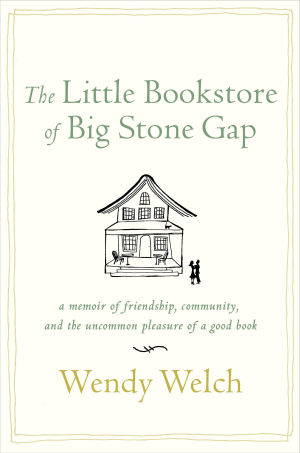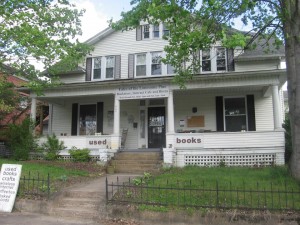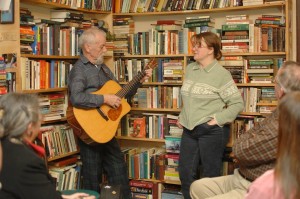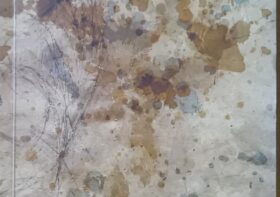The Little Bookstore of Big Stone Gap

“People who like to read love being in massed assemblage of books: bookstores, libraries, homes where the walls are lined with shelves and spines. Such places are magical”, says Wendy Welch, the author (and owner) of The Little Bookstore in Big Stone Gap.
Right from my childhood, I too have been in love with massive assemblages of books: libraries (personal, institutional or even electronic) and bookstores. From Kumar Book Stall in Guntur to Annie’s Book Stop in Vernon Hills, used book shops have always held a special attraction for me.
I know I am not alone in this. In 2006, Sri Bapu was planning a visit to Chicago. Even before he started from India, I got an e-mail with a list, culled from internet, of used bookstores in the Chicago area. After I picked him up at the airport, we drove straight into the city, checking off one bookstore after another from the list. We had a grand time even if we had to find our way in the less traveled roads and neighborhoods. Each of those bookshops had its own unique character and often offered interesting wares. Except for the weight limits for baggage to India, our purchases would have been much larger. I know for certain that one of the few things that could entice Sri Bapu to return to Chicago would be a chance to visit these book stores again.
With this history of love affairs with book shops, it took me nary a second to scoop up The Little Bookstore of Big Stone Gap when I spotted it recently in the new releases section of our library. According to the inside flap of the book jacket, this is about how two people, two cats, two dogs and thirty eight thousand books helped a small town open its heart. It turned out to be a delightful memoir about books, people and community.
 The book is written by Wendy Welch, who – together with her Scottish folksinger husband Jack Beck, opened a used (preloved) bookstore, Tales of Lonesome Pine, in Big Stone Gap, a small rural town in the mountains of Central Appalachia (Coalfields) of Virginia a few years ago. Wendy has a Ph.D. in ethnography and came to Big Stone Gap for a job with some state agency. Searching for a place to live, she and her husband fell in love with an old Victorian mansion with five bedrooms and three baths, built in 1903. That evening, it didn’t take long for them to convince themselves over a basket of chips at the local Little Mexico restaurant that this house would be the perfect place for their dream of settling down and running a nice used book store, with a café that serves locally grown food, and has incredibly beautiful hardwood floors that squeak when they walk across and lots of big windows to let in the sunlight. Someday, they agreed that they could buy this house, live upstairs and have their bookstore downstairs. Then, Jack asked, “What if someday is today?” The wait staff were startled to see Wendy leaning across the table, stomach grazing the chip basket, and kissing her best friend long and hard on the lips.
The book is written by Wendy Welch, who – together with her Scottish folksinger husband Jack Beck, opened a used (preloved) bookstore, Tales of Lonesome Pine, in Big Stone Gap, a small rural town in the mountains of Central Appalachia (Coalfields) of Virginia a few years ago. Wendy has a Ph.D. in ethnography and came to Big Stone Gap for a job with some state agency. Searching for a place to live, she and her husband fell in love with an old Victorian mansion with five bedrooms and three baths, built in 1903. That evening, it didn’t take long for them to convince themselves over a basket of chips at the local Little Mexico restaurant that this house would be the perfect place for their dream of settling down and running a nice used book store, with a café that serves locally grown food, and has incredibly beautiful hardwood floors that squeak when they walk across and lots of big windows to let in the sunlight. Someday, they agreed that they could buy this house, live upstairs and have their bookstore downstairs. Then, Jack asked, “What if someday is today?” The wait staff were startled to see Wendy leaning across the table, stomach grazing the chip basket, and kissing her best friend long and hard on the lips.
Wendy and Jack decided to follow their bliss. They wanted to live in their own skin. Using all their savings and the equity on a home they owned in their previous town, they bought the house and erected a sign, USED BOOKSTORE OPENING SOON. One of the famous writer sons of Big Stone Gap was John Fox Jr, who wrote The Trail of the Lonesome Pine. It became a musical in the 70s and is staged annually in an amphitheater across the shop. Wendy and Jack decided to name their shop, Tales of the Lonesome Pine Used Books, Music, and Internet Café.
Jack and Wendy had plenty of enthusiasm. What they didn’t have were books, money and any knowledge about running a book store or any business. Their own books that they decided to place on sale, about fifteen hundred, were sufficient to fill only a few of the shelves that Jack painstakingly built, even when the books were laid sideways next to each other,. Clearly, they needed more inventory. Also clearly, they were broke and did not have any money to get more inventory. It didn’t help much that practically everybody that met them and learned of their plan to open a bookstore in this small town of 5,400 people had pretty much the same response, “A bookstore? You’re nuts!”
Wendy’s sister suggested that inventory could be built without spending money by getting used books from people against store credit for future purchases. Wendy spent the summer going to every yard sale in the area and buying any books that were available. Slowly, they built up their inventory and had about 3,000 titles by the time they had their grand opening in October. A local celebrity author cut the ribbon and the Mayor read a proclamation welcoming them to town. Newly made friends brought food. There were people buying books. It was a nice beginning. Then, the business began to dwindle. Even a four year old grandson of a friend was asking, “How is the business doing?” Community consensus to bookshop owners: You won’t last six months. But, bless your hearts for trying, you dear sweet fools.
Wendy and Jack didn’t open their bookstore to fold and run. They soldiered on, even if they didn’t have money to advertise their business. One of their friends let them use her copier in exchange for store credit. They plastered the town with fliers. They even stood outside the local Walmart, handing out bookmarks with their store information. Slowly, more and more people became aware of the book store and the number of customers steadily increased.
To increase traffic in the store, they started special events featuring music, stories and crafts; they offered outings, International Nights, murder mystery parties, and Gourmet Nights. One of their friends described that their bookstore as a community center – a hint that their shop may be more stable than they thought.
Then, they ran afoul of the town clique. Wendy was fired from her job. People began to suspect that their business won’t last much longer and that they would be leaving town sooner than later. Business began to plummet. As Jack and Wendy tried to get more involved in the community to demonstrate their will to stay, they got rebuffed. Jack couldn’t even get into the local Kiwani’s Club. Things looked bad indeed, until a reporter for a big local newspaper with a wide circulation visited the bookstore and wrote an article that ran above the fold with a three column picture of the store on Sunday’s front page. Wendy thinks it was the nice photograph of her cat, Beulah, that got the store that coveted space and the attendant publicity. Seventy people from neighboring towns visited the bookstore that afternoon. That reporter, Stephen, saved their bacon.
Slowly, the business grew; the inventory went up to 38,000 books; the bookstore has taken up a significant portion of their house; and the store began to make a small profit. Wendy and Jack acquired many friends in the community; people volunteer to run the bookstore (store sitting) for them if they need to take time off. Despite all the dire warnings about the impending doomsday for books in print and bookstores, the Tales of Lonesome Pine is hale and healthy, thank you.
 Wendy and Jack make a decent living out of the bookstore, have their health insurance from the part-time job that Wendy got at the local college, have a network of friends, and run a nice used book store, with a café that serves locally grown food, and has hardwood floors that squeak when they walk across and lots of big windows to let in the sunlight. Their little bookstore became one of the community centers of Big Stone Gap. One day, after observing several transactions around their shop, a pastor friend compared their place to – a church, where people get fed, talk about their sadness and get a helping ear and hands.
Wendy and Jack make a decent living out of the bookstore, have their health insurance from the part-time job that Wendy got at the local college, have a network of friends, and run a nice used book store, with a café that serves locally grown food, and has hardwood floors that squeak when they walk across and lots of big windows to let in the sunlight. Their little bookstore became one of the community centers of Big Stone Gap. One day, after observing several transactions around their shop, a pastor friend compared their place to – a church, where people get fed, talk about their sadness and get a helping ear and hands.
Wendy and Jack followed their bliss and are living in their own skin.
During the course of these years, Wendy and Jack learned a few things. Books are commodities, but other people’s books need to be handled with care. There’s a whole lot of life in them – and not just in words. They also learned that bookstores are more than just places where people go to buy books. Often, a bookstore is a third place that is neither work nor home, where we are known by our names and valued for being whatever we decide to be. Sometimes, they are safe places where you can talk to a stranger in a relaxed atmosphere, sharing your sorrows and lightening your load of worries. Wendy tells quite a few poignant stories of people that she came across: the chatty veteran with the big grin who frequented their store and bought many westerns, who she later finds out did not know how to read; the veteran who was ditched by his wife while he was abroad fighting a war; and many others. She also paints a picture of the many friends that helped them in various ways along the way. It is difficult to quarrel with her conclusion that the most important quality for one to operate a used bookstore is not love of books, but love of people. It seems that Jack and Wendy have both qualities. In spades.
Among the many activities that the bookstore created was a writer’s group. Wendy Welch began shared with the group her experiences in running the bookstore. They encouraged her writing, and eventually, she got a publishing contract that resulted in this book.
Wendy has not as much written a book as she was telling us a story – nay, scratch that – lots of stories. She has a delightful, self-deprecating, chatty, charming style that makes it easy to read and brings on a smile or a guffaw quite often. Her love of her husband and her fondness for her friends, customers and people in general comes across clearly. She has quite a few opinions, but drives her points home with gentle humor. I enjoyed the book a lot even if it has the clichéd theme of people taking on a difficult and romantic task and succeeding against huge odds.
Each of the chapters starts with an epigraph about books and reading. There are lots of literary references sprinkled all along. And, Wendy makes quite a few well articulated pithy observations of her own. I liked many of the characters that she introduces along the way, and could relate very well to Bill, one of her customers whose taste could not be pigeonholed, as he simply says, “I like what I like, and what I like is to like what I read.”
I liked what I read here.
—
Read Wendy Welch’s blog here.
Facebook page of Tales of Lonesome Pine here.
The pictures with this article are of the bookstore and Jack and Wendy.
—
The Little Bookstore of Big Stone Gap
Wendy Welch
October 2012
St. Martin’s Press, New York
293 pages.




Leave a Reply